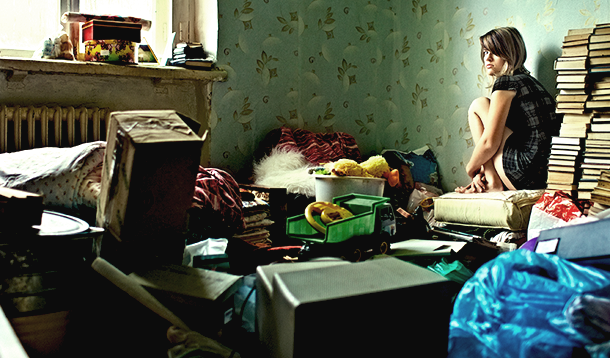
“Messy house, messy mind.” We all know the adage. It used to just be a saying to guilt people into keeping their space clean, but now there have been actual studies done that show it’s literally true. Clutter causes, or at least worsens, anxiety and depression.
Even for people without clinical anxiety or depression, decluttering can be a much needed mental health and self-care boost. Look at everyone freaking out over Marie Kondo right now. Consignment shops and second hand stores are overflowing with a sudden influx of joyless items.
As someone who lives with both depression and anxiety, I feel this on a deep level. A messy living space absolutely causes my mental health to suffer. But what this KonMari craze, and even the notion of tidy space, tidy mind misses is the complicated relationship between anxiety/depression and – stuff.
The logical response to the finding that clutter creates anxiety and depression is to clean your living space. It makes sense. If it causes discord, fix it. You will feel so much better after. So why is my room always a disaster?
It’s because clutter and depression are a vicious cycle. Looking around at the mess in my room causes me great discomfort and a desire to organize it – but the same depression and anxiety worsened by this mess also paralyze me to tackle it. Depression is overwhelming, and so frequently small tasks, like cleaning your room, can feel insurmountable.
It comes across as lazy. It comes across as disorganized. What it is is a merry-go-round of mental illness. For people who simply feel a little off when their space is messy, organization overhauls and regular upkeep works miracles. But for those of us with deeper mental illness, it can turn into a guilt-shame spiral that shuts down the whole works.
What might surprise many people is that I also have OCD (Obsessive-Compulsive Disorder). If you believe the jokes and memes that circulate the internet, my space should be spotless. In fact, according to most memes, if you invite me to your house, I’ll clean that too. It simply isn’t true. Mental illness rarely fosters productivity and healthy changes. It’s more like trying to do everything other people do, while wearing a fire fighter suit and mask.
People often try to be helpful and offer suggestions to depression and anxiety sufferers. The new KonMari craze has been no exception. “Try it! You’ll feel so much better!” It’s innocent, but it’s ableist. And it’s really not that simple. It isn’t that it’s hard to get rid of the clutter emotionally like it would be for a hoarder. In fact, if someone else did it, most of us would happily KonMari the hell out of our houses. It’s simply too overwhelming to physically do it.
Another way depression and “stuff” co-mingle is making purchases, especially online. I won’t speak for everyone with depression, but for me, searching out something to buy, even minor and inexpensive like a coffee filter, is a good distraction and gives me a purpose. And then waiting for that package to arrive gives me something to look forward to. Joy is fleeting and hard to find when you suffer from depression, and making these purchases gives a bit of relief. I’m not talking shopping addiction, or harmful spending, just simply the accumulation of stuff for the joy of its anticipation.
Managing real emotions is difficult with depression and anxiety. Mental illness lies. Just as small tasks can seem impossible to accomplish, finding things in life that genuinely bring you joy can be difficult too. It becomes easier to excitedly await an Amazon or Etsy purchase, grabbing that bit of good emotion, than it does trying to find meaningful contentment – even if that joy is fleeting.
So do KonMari. Do declutter. Do acknowledge that an organized and tidy space is good for everyone’s mental health. But be aware that the relationship between stuff and mental illness is complicated for many, and although we are longing to join your efforts, sometimes we just can’t manage it.